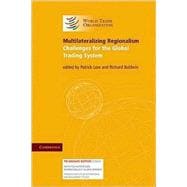
Note: Supplemental materials are not guaranteed with Rental or Used book purchases.
Purchase Benefits
What is included with this book?
| List of contributors | p. viii |
| Foreword | p. xi |
| Acknowledgements | p. xiv |
| Introduction | p. 1 |
| Background to Regionalism | p. 11 |
| A historical perspective on regionalism | p. 13 |
| The landscape of regional trade agreement and WTO surveillance | p. 28 |
| Multilateralization: Prospects and Past Experience | p. 77 |
| Beyond tariffs: multilateralizing non-tariff RTA commitments | p. 79 |
| Comment | p. 142 |
| Multilateralizing regionalism: lessons from the EU experience in relaxing rules of origin | p. 146 |
| The Information Technology Agreement: sui generis or model stepping stone? | p. 182 |
| Comment | p. 217 |
| Multilateralization: Sectors and Themes | p. 219 |
| Services provisions in regional trade agreements: stumbling blocks or building blocks for multilateral liberalization? | p. 221 |
| Harmonizing preferential rules of origin regimes around the world | p. 262 |
| Comment | p. 364 |
| Legal avenues to 'multilateralizing regionalism': beyond Article XXIV | p. 368 |
| Multilateralization: Regional Perspectives | p. 401 |
| Multilateralizing regionalism: case study of African regionalism | p. 403 |
| Multilateralizing RTAs in the Americas: state of play and ways forward | p. 427 |
| Comment | p. 492 |
| Multilateralizing regional trade arrangements in Asia | p. 495 |
| Comment | p. 550 |
| Fitting Asia-Pacific agreements into the WTO system | p. 554 |
| Multilateralizing preferential trade agreements: a developing country perspective | p. 636 |
| Comment | p. 681 |
| The challenge of negotiating RTAs for developing countries. What could the WTO do to help? | p. 684 |
| Comment | p. 705 |
| Index | p. 708 |
| Table of Contents provided by Ingram. All Rights Reserved. |
The New copy of this book will include any supplemental materials advertised. Please check the title of the book to determine if it should include any access cards, study guides, lab manuals, CDs, etc.
The Used, Rental and eBook copies of this book are not guaranteed to include any supplemental materials. Typically, only the book itself is included. This is true even if the title states it includes any access cards, study guides, lab manuals, CDs, etc.